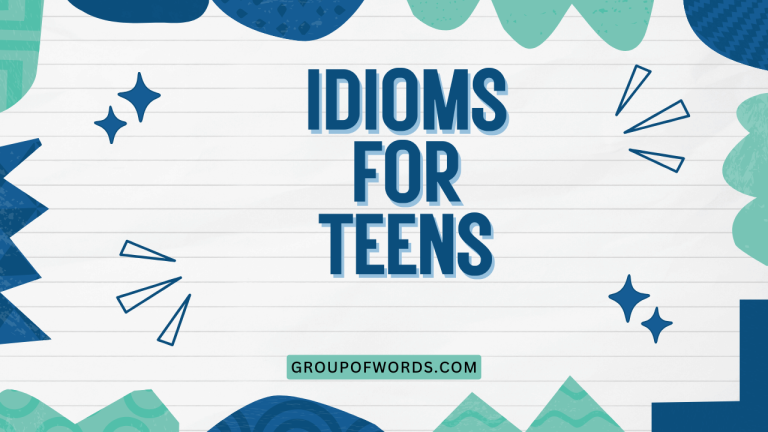Idioms for a Funny Person: A Comprehensive Guide
Understanding idioms is crucial for mastering the nuances of the English language, especially when describing personality traits. Idioms related to humor and funny people add color and depth to our conversations, making them more engaging and relatable.
This article delves into a variety of idioms used to describe someone who is funny, witty, or humorous. Whether you are an English language learner, a writer looking to enrich your vocabulary, or simply someone interested in the quirks of language, this guide will provide you with a comprehensive understanding of these expressions.
This article will cover definitions, structural breakdowns, usage rules, common mistakes, and practice exercises to help you confidently use these idioms. By the end of this guide, you will have a solid grasp of idioms that capture the essence of humor and be able to identify and appreciate them in various contexts.
Table of Contents
- Introduction
- Definition of Idioms for a Funny Person
- Structural Breakdown of Idioms
- Types and Categories of Idioms
- Examples of Idioms for a Funny Person
- Usage Rules for Idioms
- Common Mistakes When Using Idioms
- Practice Exercises
- Advanced Topics: The Nuances of Humor
- Frequently Asked Questions (FAQ)
- Conclusion
Definition of Idioms for a Funny Person
An idiom is a phrase or expression whose meaning cannot be understood from the ordinary meanings of the words it contains. In the context of describing a “funny person,” idioms are used to convey the specific type of humor they possess.
These idioms often rely on figurative language, cultural references, and shared understandings to communicate effectively. They add depth and color to descriptions, making them more vivid and relatable.
The function of these idioms is to provide a more nuanced and expressive way to describe someone’s humor. Instead of simply saying “He is funny,” one might say “He’s a real card” or “She can always crack me up,” providing a deeper insight into the nature of their humor.
The context in which these idioms are used is crucial; their effectiveness depends on the audience’s familiarity with the expression and the situation being described.
Idioms related to humor can be classified based on the type of humor they describe, such as wit, general humor, comedic talent, playfulness, or sarcasm. Each category captures a different aspect of what makes someone funny, allowing for a more precise and descriptive portrayal.
Structural Breakdown of Idioms
Idioms, by definition, defy literal interpretation. Their structure often involves a combination of words that, when taken individually, do not convey the intended meaning.
The structural components of idioms can include nouns, verbs, adjectives, and prepositions, arranged in a way that creates a figurative expression.
The patterns in which these elements are arranged vary widely. Some idioms follow simple subject-verb-object structures, while others are more complex, involving prepositional phrases or embedded clauses.
What’s important is that the entire phrase, as a unit, carries a specific meaning that is different from the sum of its parts.
For example, consider the idiom “a laugh a minute.” Structurally, it seems to suggest that there is one laugh per minute. However, the actual meaning is that someone or something is extremely funny and produces constant laughter.
Understanding the structure helps to identify that it is indeed an idiom and not a literal statement.
Types and Categories of Idioms
Idioms describing a funny person can be categorized based on the specific type of humor they convey. The following are some main categories and explanations:
Idioms Describing Wit
These idioms characterize someone who is quick-witted, intelligent, and clever in their humor. Wit often involves sharp, insightful observations and a talent for wordplay.
Idioms Describing General Humor
These idioms describe someone who is generally funny and able to make people laugh. They might not be particularly witty or comedic, but they have a natural ability to bring humor to situations.
Idioms Describing Comedic Talent
These idioms refer to individuals who possess a natural talent for comedy. They are often skilled at telling jokes, performing, and creating humorous situations.
Idioms Describing Playfulness
These idioms describe someone who is lighthearted, fun-loving, and enjoys making jokes and playing pranks. Their humor is often innocent and good-natured.
Idioms Describing Sarcasm
These idioms describe someone who uses sarcasm as a form of humor. Sarcasm involves saying the opposite of what you mean, often with the intention of being critical or mocking.
Examples of Idioms for a Funny Person
Below are several examples of idioms for a funny person, categorized by the type of humor they describe. Each category contains a variety of idioms, along with example sentences to illustrate their usage.
The tables provide a comprehensive overview of these expressions, enhancing understanding and application.
Examples of Witty Idioms
The following table provides examples of idioms used to describe someone who is witty. These idioms often highlight the person’s intelligence and quick thinking.
| Idiom | Meaning | Example Sentence |
|---|---|---|
| Quick as a whip | Very intelligent and responsive | She’s quick as a whip; she always has a clever comeback. |
| Sharp as a tack | Very intelligent and perceptive | He’s as sharp as a tack, always making insightful jokes. |
| Has a way with words | Skilled at using language effectively | The comedian has a way with words that always makes the audience laugh. |
| Silver-tongued | Persuasive and eloquent | The silver-tongued orator had the crowd roaring with laughter. |
| On the ball | Alert and competent | He’s always on the ball with his witty remarks. |
| Whip-smart | Extremely intelligent and quick-thinking | She’s whip-smart and can deliver a punchline perfectly. |
| Brainy | Intelligent | He’s a brainy comedian who incorporates intellectual humor into his act. |
| A walking encyclopedia | Someone who knows a lot of facts | He’s a walking encyclopedia, and his humor often involves obscure trivia. |
| Knows their stuff | Knowledgeable and competent | The witty professor knows their stuff and uses humor to make lectures engaging. |
| Bright spark | An intelligent and lively person | She’s a bright spark who always has a witty comment to make. |
| Has all their marbles | Mentally sound and intelligent | Despite his age, he still has all his marbles and a sharp sense of humor. |
| Street smart | Having the knowledge and experience necessary to deal with the potential difficulties or dangers of life in an urban environment | He’s street smart and incorporates his experiences into his witty stand-up routine. |
| Book smart | Intelligent due to academic learning | She’s book smart and uses her extensive knowledge to create witty parodies. |
| Quick-witted | Able to think and respond quickly | His quick-witted responses always catch people off guard and make them laugh. |
| Sharp-witted | Having or showing quick intelligence | Her sharp-witted observations about daily life are hilariously relatable. |
| Has their wits about them | Able to think quickly and make sensible decisions | He always has his wits about him, delivering clever punchlines even under pressure. |
| A smart cookie | An intelligent person | She’s a smart cookie and uses her intelligence to create witty and engaging content. |
| A whiz | A person who is extremely good at something | He’s a whiz at creating witty puns. |
| A genius | Exceptional intellectual or creative power | Some consider him a genius because of his incredibly witty and original comedy. |
| One smart apple | A clever or intelligent person | She’s one smart apple and uses her wit to make insightful social commentary. |
| A keen mind | An intelligent or sharp mind | He has a keen mind and can always come up with a witty retort. |
| A bright mind | An intelligent or sharp mind | She has a bright mind and uses her wit to make insightful social commentary. |
| A brilliant mind | An intelligent or sharp mind | He has a brilliant mind and can always come up with a witty retort. |
Examples of Humorous Idioms
This table showcases idioms that describe someone who is generally humorous, able to make others laugh without necessarily being exceptionally witty or comedic.
| Idiom | Meaning | Example Sentence |
|---|---|---|
| A barrel of laughs | Very funny and entertaining | He’s a barrel of laughs; he always has everyone in stitches. |
| A real card | A funny or amusing person | She’s a real card; she always knows how to lighten the mood. |
| Cracks me up | Makes someone laugh a lot | His silly jokes always crack me up. |
| A laugh a minute | Very funny; full of humor | Watching his stand-up routine is a laugh a minute. |
| In stitches | Laughing uncontrollably | His stories had us all in stitches. |
| A riot | A very funny or entertaining person or thing | The party was a riot; everyone was laughing and having a great time. |
| Full of hot air | Talking a lot without saying anything important or meaningful | He’s full of hot air, but at least he makes people laugh. |
| Always clowning around | Always behaving in a silly or playful way | He’s always clowning around, trying to make people laugh. |
| Life of the party | The most fun and entertaining person at a party | She’s always the life of the party, telling jokes and keeping everyone entertained. |
| A comedian | Someone who entertains people by telling jokes | He’s a natural comedian; he can make anyone laugh. |
| Lightens the mood | Makes a situation less serious or tense | She always lightens the mood with her funny stories. |
| A ray of sunshine | A person who brings happiness to others | He’s a ray of sunshine, always making people smile. |
| Full of beans | Full of energy and enthusiasm | He’s full of beans and always makes everyone laugh with his antics. |
| A caution | Someone or something that is remarkable or outrageous | He’s a caution; you never know what funny thing he’ll do next. |
| A scream | Very funny | The movie was a scream; I laughed the whole time. |
| A hoot | Amusing or entertaining | The party was a hoot; everyone had a great time. |
| A card | A funny or amusing person | He’s a card; he always knows how to lighten the mood. |
| A character | An interesting or amusing person | She’s quite a character; she always has a funny story to tell. |
| A wag | A humorous or mischievous person | He’s a wag; he always has a trick up his sleeve. |
| A caution to snakes | Someone whose behavior is outrageous or unpredictable | He’s a caution to snakes; you never know what funny thing he’ll do next. |
| A funny bunny | A humorous person | She’s a funny bunny; she always knows how to make people laugh. |
| A laugh merchant | A person who makes a living by making people laugh | He’s a laugh merchant; he’s always trying to come up with new jokes. |
| A giggle merchant | A person who makes a living by making people giggle | She’s a giggle merchant; she’s always trying to come up with new jokes. |
Examples of Comedic Idioms
This table provides idioms to describe someone with a natural talent for comedy, skilled at telling jokes and creating humorous situations.
| Idiom | Meaning | Example Sentence |
|---|---|---|
| Has a gift for comedy | Naturally talented at making people laugh | He has a gift for comedy; his timing is impeccable. |
| A natural comedian | Someone who is effortlessly funny | She’s a natural comedian; she can make anyone laugh without even trying. |
| Born to be a comedian | Destined to be a funny person | He was born to be a comedian; he’s been making people laugh since he was a child. |
| A stand-up guy | A person of good character, also implies someone who could do stand-up comedy | He’s a stand-up guy, both in character and on stage. |
| Has the comedic touch | Possesses the ability to make things funny | She has the comedic touch; everything she does is hilarious. |
| A comic genius | An exceptionally talented comedian | He’s a comic genius; his jokes are always original and hilarious. |
| A master of comedic timing | Extremely skilled at delivering jokes effectively | She’s a master of comedic timing; her punchlines always land perfectly. |
| A funny bone | The part of a person that responds to humor | He knows how to tickle your funny bone. |
| A sense of humor | The ability to appreciate humor and make others laugh | She has a great sense of humor and always knows how to make me laugh. |
| Good sense of humor | The ability to appreciate humor and make others laugh in a good way | He has a good sense of humor and always knows how to make me laugh without being offensive. |
| Keen sense of humor | The ability to appreciate humor and make others laugh in a keen way | She has a keen sense of humor and always knows how to make me laugh without being offensive. |
| Dry sense of humor | The ability to appreciate humor and make others laugh in a dry way | He has a dry sense of humor and always knows how to make me laugh without being offensive. |
| Dark sense of humor | The ability to appreciate humor and make others laugh in a dark way | She has a dark sense of humor and always knows how to make me laugh without being offensive. |
| Wry sense of humor | The ability to appreciate humor and make others laugh in a wry way | He has a wry sense of humor and always knows how to make me laugh without being offensive. |
| Subtle sense of humor | The ability to appreciate humor and make others laugh in a subtle way | She has a subtle sense of humor and always knows how to make me laugh without being offensive. |
| Self-deprecating sense of humor | The ability to appreciate humor and make others laugh in a self-deprecating way | He has a self-deprecating sense of humor and always knows how to make me laugh without being offensive. |
| An eye for the ridiculous | The ability to see the funny side of things | She has an eye for the ridiculous and always knows how to make me laugh. |
| A light touch | A gentle or delicate way of dealing with something | He has a light touch and always knows how to make me laugh without being offensive. |
| A deft touch | A skillful or clever way of dealing with something | She has a deft touch and always knows how to make me laugh without being offensive. |
| A sure touch | A confident or certain way of dealing with something | He has a sure touch and always knows how to make me laugh without being offensive. |
| A way with people | The ability to get along with people easily | She has a way with people and always knows how to make me laugh. |
| A way with words | The ability to use language effectively | He has a way with words and always knows how to make me laugh. |
Examples of Playful Idioms
The following table provides idioms that describe someone who is playful, lighthearted, and enjoys making jokes and playing pranks in a good-natured way.
| Idiom | Meaning | Example Sentence |
|---|---|---|
| Full of mischief | Inclined to cause trouble in a playful way | He’s full of mischief; he’s always playing pranks on his friends. |
| A prankster | Someone who plays practical jokes | She’s a prankster; she loves to surprise people with her silly jokes. |
| A joker | Someone who is always telling jokes | He’s a joker; he always has a funny story to tell. |
| A tease | Someone who playfully makes fun of others | She’s a tease; she loves to playfully mock her friends. |
| A kidder | Someone who jokes around | He’s a kidder; he’s always making light of serious situations. |
| Always kidding around | Always joking and playing pranks | She’s always kidding around, trying to make people laugh. |
| A bundle of fun | A very enjoyable person to be around | He’s a bundle of fun; everyone loves spending time with him. |
| A fun-loving person | Someone who enjoys having fun | She’s a fun-loving person; she’s always up for a good time. |
| A playful spirit | Someone with a lighthearted and fun attitude | He has a playful spirit; he always brings joy to those around him. |
| A light heart | A cheerful and carefree attitude | She has a light heart; she never lets anything get her down. |
| A sunny disposition | A cheerful and optimistic attitude | He has a sunny disposition; he always sees the best in people. |
| A merry soul | A cheerful and lively person | She’s a merry soul; she always brings joy to those around her. |
| A happy-go-lucky attitude | Carefree and cheerful | He has a happy-go-lucky attitude and always makes everyone laugh. |
| A free spirit | Someone who is independent and unconventional | She’s a free spirit and always brings a sense of fun to any situation. |
| A ray of sunshine | A person who brings happiness to others | He’s a ray of sunshine and always makes everyone smile. |
| A barrel of monkeys | Full of energy and fun | The kids were a barrel of monkeys at the party. |
| A live wire | Full of energy and enthusiasm | She’s a live wire and always brings excitement to any event. |
| A ball of fire | Energetic and enthusiastic | He’s a ball of fire and always gets everyone motivated. |
| A whirlwind | Full of energy and activity | She’s a whirlwind and always keeps everyone on their toes. |
| A dynamo | Full of energy and power | He’s a dynamo and always gets things done. |
| A powerhouse | Full of energy and strength | She’s a powerhouse and always gets results. |
| A bundle of laughs | Very funny and entertaining | He’s a bundle of laughs and always makes everyone laugh. |
| A scream | Very funny | The movie was a scream and I laughed the whole time. |
Examples of Sarcastic Idioms
This table highlights idioms used to describe someone who uses sarcasm as a form of humor, often saying the opposite of what they mean to be critical or mocking.
| Idiom | Meaning | Example Sentence |
|---|---|---|
| Dry wit | Sarcastic or understated humor | He has a dry wit; his sarcastic comments are often hilarious. |
| A sarcastic tongue | A tendency to make sarcastic remarks | She has a sarcastic tongue; you never know if she’s being serious or not. |
| Sharp-tongued | Given to making critical or sarcastic remarks | He’s sharp-tongued; he always has a cutting remark ready. |
| A master of sarcasm | Extremely skilled at using sarcasm | She’s a master of sarcasm; her comments are always witty and cutting. |
| Biting wit | Harsh or cruel humor | He has a biting wit; his jokes can sometimes be offensive. |
| A cynical sense of humor | A pessimistic and sarcastic outlook on life | She has a cynical sense of humor; she always finds something to complain about. |
| Tongue-in-cheek | Expressing a thought in a way that appears serious but is actually joking | He made a tongue-in-cheek comment about the situation. |
| With a straight face | Saying something funny or sarcastic without showing any emotion | She delivered the sarcastic remark with a straight face. |
| A deadpan delivery | Delivering a joke or sarcastic comment without showing any emotion | He has a deadpan delivery that makes his jokes even funnier. |
| A sardonic sense of humor | Grimly mocking or cynical | She has a sardonic sense of humor; she finds humor in dark situations. |
| A wry sense of humor | Dryly humorous, often with a touch of irony | He has a wry sense of humor; he finds humor in everyday situations. |
| Playfully mocking | Making fun of someone in a lighthearted way | She’s playfully mocking her friend’s fashion sense. |
| A dry sense of humor | Subtle and understated sarcasm | He has a dry sense of humor that can sometimes be missed. |
| A dark sense of humor | Finding humor in morbid or unsettling topics | She has a dark sense of humor that some people find disturbing. |
| A self-deprecating sense of humor | Making jokes at one’s own expense | He has a self-deprecating sense of humor, which makes him relatable. |
| A sarcastic quip | A witty and sarcastic remark | She delivered a sarcastic quip that made everyone laugh. |
| A biting remark | A critical and sarcastic comment | He made a biting remark that stung the recipient. |
| A cutting comment | A hurtful and sarcastic remark | She made a cutting comment that left the room silent. |
| A backhanded compliment | An insult disguised as a compliment | He gave her a backhanded compliment about her new dress. |
| A double-edged sword | Something that has both positive and negative consequences | His sarcasm is a double-edged sword; it can be funny but also offensive. |
| A wolf in sheep’s clothing | Someone who appears harmless but is actually dangerous | His sarcasm makes him seem harmless, but he can be a wolf in sheep’s clothing. |
| A snake in the grass | Someone who is treacherous and deceitful | Her sarcasm makes her seem witty, but she can be a snake in the grass. |
| A two-faced person | Someone who says one thing to your face and another behind your back | His sarcasm makes him seem clever, but he can be a two-faced person. |
Usage Rules for Idioms
Understanding the usage rules for idioms is crucial to using them correctly and effectively. Here are some key guidelines to follow:
- Context is Key: Always consider the context in which you are using the idiom. Idioms are often specific to certain situations or types of conversations.
- Audience Awareness: Be mindful of your audience. Not everyone may be familiar with the same idioms, especially if they are not native English speakers or come from a different cultural background.
- Avoid Overuse: While idioms can add color to your language, overusing them can make your speech sound unnatural or contrived.
- Maintain Grammatical Consistency: Even though idioms are not literal, they still need to be grammatically correct within the sentence.
- Do Not Alter Idioms: Idioms have fixed structures, and changing them can alter their meaning or make them nonsensical.
It’s also important to note that some idioms may have regional variations or different connotations depending on the cultural context. Being aware of these nuances can help you use idioms more appropriately and avoid misunderstandings.
For instance, the idiom “a barrel of laughs” is generally understood to mean someone is very funny. However, in certain contexts, it might be used sarcastically to imply the opposite.
Always pay attention to the tone and intent behind the idiom’s usage.
Common Mistakes When Using Idioms
Using idioms incorrectly is a common mistake among English language learners. Here are some frequent errors and how to avoid them:
| Incorrect | Correct | Explanation |
|---|---|---|
| He is a card box. | He is a real card. | “A real card” is the correct idiom for a funny person, not “card box.” |
| She cracks me up high. | She cracks me up. | The idiom is simply “cracks me up,” adding “high” is incorrect. |
| They are in stitches of laughter. | They are in stitches. | The correct idiom is “in stitches,” not “in stitches of laughter.” |
| He has a gift from comedy. | He has a gift for comedy. | The preposition “for” is essential in the idiom “a gift for comedy.” |
| She is full with mischief. | She is full of mischief. | The correct preposition is “of,” not “with.” |
| He is a master in sarcasm. | He is a master of sarcasm. | The correct preposition is “of,” not “in.” |
| She has a tongue in her cheek. | She has her tongue in her cheek. | The possessive pronoun “her” is necessary. |
| He’s a barrel full of laughs. | He’s a barrel of laughs. | Using “full” is redundant and incorrect. |
| She is the life from the party. | She is the life of the party. | The correct preposition is “of,” not “from.” |
| He has a dry witty. | He has a dry wit. | “Wit” is the noun form, not “witty.” |
By being aware of these common mistakes, you can avoid errors and use idioms more confidently and accurately.
Practice Exercises
Test your understanding of idioms for a funny person with these practice exercises. Choose the correct idiom to complete each sentence.
| Question | Options | Answer |
|---|---|---|
| 1. He’s such ________; he always knows how to make us laugh. | a) a real box b) a real card c) a real book | b) a real card |
| 2. Her jokes always ________. | a) crack me down b) crack me up c) crack me over | b) crack me up |
| 3. The comedian had the audience ________. | a) in threads b) in stitches c) in buttons | b) in stitches |
| 4. She ________ for comedy; her timing is perfect. | a) has a gift to b) has a gift with c) has a gift for | c) has a gift for |
| 5. He’s ________; he’s always playing pranks on his friends. | a) full in mischief b) full with mischief c) full of mischief | c) full of mischief |
| 6. She has a ________; her sarcastic comments are hilarious. | a) dry witty b) dry wit c) dry wise | b) dry wit |
| 7. He delivered the joke ________. | a) with a straight face b) with a crooked face c) with a funny face | a) with a straight face |
| 8. She’s always ________, trying to make people laugh. | a) clowning around b) clowning over c) clowning
around |
a) clowning around |
Advanced Topics: The Nuances of Humor
The use of idioms to describe humor often varies across different cultures and regions. What might be considered funny in one culture could be offensive or nonsensical in another.
Understanding these cultural nuances is essential for effective communication and avoiding misunderstandings.
For example, sarcasm, as described earlier, is a type of humor that relies heavily on context and tone. In some cultures, sarcasm is widely used and appreciated, while in others, it may be seen as rude or insincere.
Similarly, idioms that reference specific cultural events or figures may not be understood by those unfamiliar with that culture.
Moreover, the perception of humor can change over time. Idioms that were once popular may become outdated or acquire new meanings.
Staying current with contemporary language and cultural trends is important for using idioms appropriately.
Additionally, the role of idioms in comedic writing and performance cannot be overstated. Comedians often use idioms to create relatable and humorous situations, connect with their audience, and add depth to their material.
The ability to use idioms effectively is a valuable skill for anyone involved in the creation or performance of comedy.
Frequently Asked Questions (FAQ)
What is the difference between an idiom and a metaphor?
An idiom is a phrase whose meaning is not deducible from the literal meanings of its words, while a metaphor is a figure of speech that directly compares two unrelated things. Idioms often have a fixed structure and meaning, whereas metaphors are more flexible and can be created on the spot.
How can I improve my understanding of idioms?
To improve your understanding of idioms, read widely, listen to native speakers, and pay attention to the context in which idioms are used. Keep a notebook of new idioms you encounter, along with their meanings and example sentences.
Are idioms universal across all English-speaking countries?
No, idioms can vary significantly between different English-speaking countries and regions. Some idioms may be specific to the United States, while others may be more common in the United Kingdom, Australia, or Canada.
Is it okay to mix idioms in a sentence?
Mixing idioms in a sentence is generally not recommended, as it can create confusion and sound unnatural. It’s best to use one idiom at a time and ensure it fits the context appropriately.
Can idioms be translated directly into other languages?
No, idioms usually cannot be translated directly into other languages because their meanings are not literal. Instead, you would need to find an equivalent idiom in the target language that conveys a similar meaning.
Conclusion
Mastering idioms for describing a funny person can significantly enhance your ability to communicate effectively and add color to your language. By understanding the definitions, structural breakdowns, usage rules, and common mistakes associated with these idioms, you can confidently use them in various contexts.
Remember to consider the context, audience, and cultural nuances when using idioms, and avoid overusing or altering them. With practice and attention to detail, you can develop a strong command of these expressions and appreciate the richness and complexity of the English language.






